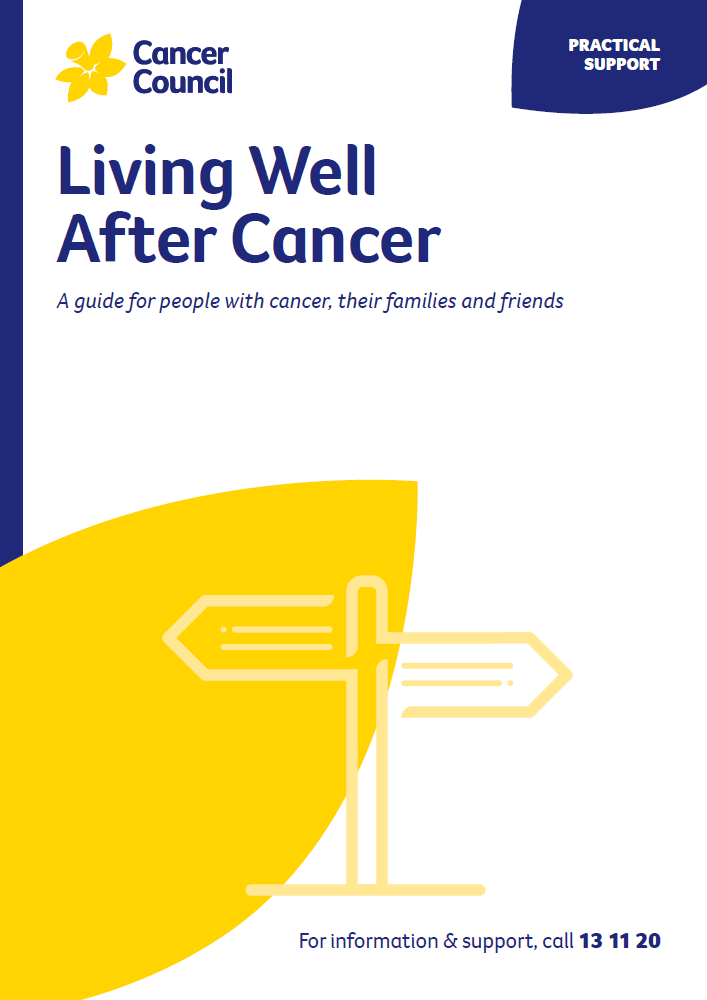- Home
- Brain tumours
- Life after treatment
Life after treatment for brain cancer
Some people continue to have regular treatment, but for those who finish their treatment, the cancer experience doesn’t usually end there. Life after cancer treatment can present its own challenges. You may have mixed feelings when treatment ends, and worry about the cancer coming back.
Learn more about:
- Overview
- Follow-up appointments
- Dealing with feelings of sadness
- Looking after yourself
- What if the tumour returns?
- Video: Looking after you and me – a guide for people affected by brain cancer
Overview
Some people say that they feel pressure to return to “normal life”. It is important to allow yourself time to adjust to the physical and emotional changes, and establish a new daily routine at your own pace. Your family and friends may also need time to adjust.
Cancer Council 13 11 20 can help you connect with other people who have had cancer, and provide you with information about the emotional and practical aspects of living well after cancer.
For more on this, see Living well after cancer
Follow-up appointments
After treatment ends, you will have regular appointments to monitor your health, manage any long-term side effects and check that the tumour hasn’t come back or spread. During these check-ups, you will usually have a physical examination and you may have blood tests or MRI scans.
How often you see your doctor will depend on the type of tumour and treatments you had. Between follow-up appointments, let your doctor know immediately of any new or changing symptoms or health problems.
When a follow-up appointment or test is approaching, you may feel anxious. Talk to your treatment team or call Cancer Council 13 11 20 if you are finding it hard to manage this anxiety.
Dealing with feelings of sadness
If you have continued feelings of sadness, have trouble getting up in the morning or have lost motivation to do things that you used to enjoy, you may be experiencing depression. This is quite common among people who have had cancer.
Talk to your GP, as counselling or medication, even for a short time, may help. You may be eligible for Medicare rebated sessions with a psychologist. Cancer Council may run a counselling program in your area.
For information about coping with depression and anxiety, call Beyond Blue on 1300 22 46 36. For 24-hour crisis support, call Lifeline 13 11 14.
The Thing About Cancer
Listen to our podcast The Thing About Cancer for information and insights that can help you navigate through the challenges of living with cancer.
Looking after yourself
Cancer can cause physical and emotional strain, so it’s important to look after your wellbeing. Cancer Council has free booklets and programs to help you during and after treatment.
Call 13 11 20 to find out more, or see Managing cancer side effects, Exercise after a cancer diagnosis, Complementary therapies, Emotions and cancer, Nutrition and cancer, Sexuality, intimacy and cancer, Fertility and cancer, and Living well after cancer.
Alternative therapies are therapies used instead of conventional medical treatments. These are unlikely to be scientifically tested, may prevent successful treatment of the cancer and can be harmful. Cancer Council does not recommend the use of alternative therapies as a cancer treatment.
What if the tumour returns?
For some people, a brain or spinal cord tumour can come back or keep growing despite treatment. If the tumour returns, this is called a recurrence.
Treatment options if the tumour returns
Your treatment options will depend on your situation and the treatments you’ve already had, but may include surgery, radiation therapy combined with drug therapies including chemotherapy, or another systemic therapy.
Targeted therapy drugs attack specific features of cancer cells. Bevacizumab is a targeted therapy drug that can be used to treat advanced brain cancer. Bevacizumab is most helpful when the tumour is causing swelling in the brain. Your doctor will talk to you about the benefits and possible risks.
Other targeted therapy drugs and immunotherapy may be available on clinical trials. Talk with your doctor about the latest developments and whether you are a suitable candidate.
→ READ MORE: Brain tumours in children
Video: Looking after you and me
Podcast: Meditation – Awareness of breathing
Listen to more of our meditation and relaxation podcast
More resources
Prof Lindy Jeffree, Director of Neurosurgery, Alfred Health, VIC; Caitriona Nienaber, 13 11 20 Consultant, Cancer Council WA; Prof Tamara Ownsworth, Clinical Neuropsychologist and Research Director, The Hopkins Centre, Griffith University, QLD; A/Prof Hao-Wen Sim, Medical Oncologist, The Kinghorn Cancer Centre and Chris O’Brien Lifehouse, NSW; Megan Trevethan, Clinical Specialist Occupational Therapy – Cancer and Lymphoedema Services, Princess Alexandra Hospital, QLD; Chris Twyford, Cancer Specialist Nurse, Canberra Health Services, Cancer and Ambulatory Support, ACT; Dr Adam Wells, Clinical Academic Consultant Neurosurgeon, The University of Adelaide, Royal Adelaide Hospital, SA.
View the Cancer Council NSW editorial policy.
View all publications or call 13 11 20 for free printed copies.

